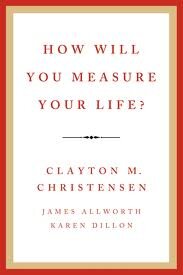Book Review: How Will You Measure Your Life?
 Harvard professor Clayton Christensen is one of my favorite business thinkers, right up there with Peter Drucker, Henry Mintzberg, Gary Hamel, and a couple of others.Unlike most business writers, Christensen understands the importance of theory. He writes:
Harvard professor Clayton Christensen is one of my favorite business thinkers, right up there with Peter Drucker, Henry Mintzberg, Gary Hamel, and a couple of others.Unlike most business writers, Christensen understands the importance of theory. He writes:
MANY BUSINESS RESEARCHERS, consultants, and writers create and sell us static views—snapshots—of technologies, companies, and markets. [These] tell us little about how they got there. Nor do they tell us what is likely to happen in the future. My colleagues, my students, and I have eschewed the profession of photography. Instead we are making 'movies' of management.
This book applies the same concept of using theories to what's important in your life. He begins by talking about knowing some of the leaders caught up in recent scandals, like Jeffrey Skilling from Enron, a Harvard graduate. The book sets out to help you answer three questions with respect to "How will you measure your life":
- How can I be sure that I will be successful and happy in my career?
- How can I be sure my relationships with my spouse, my children, and my extended family and close friends become an enduring source of happiness?
- How can I be sure to live a life of integrity—and stay out of jail?
The last one about staying out of jail may seem unnecessary, but given the number of Harvard MBAs who have ran afoul of the law in recent times, perhaps not.What's interesting about this work is that it applies the same logic of using theories, which Christensen uses in his work with business leaders, to your personal life. It's only theories that allow us to peer in the future, since conclusive data is only available about the past.
I Don't Have an Opinion, the Theory Has an Opinion. When people ask me something, I now rarely answer directly. A good theory doesn't change its mind: it doesn't apply only to some companies or people, and not to others. It is a general statement of what causes what, and why. Good theory can help us categorize, explain, and, most important, predict.
You shouldn't need Liz Taylor's record on marriage to know what it takes for a good marriage. Theories help us explain what will happen before you experience it. He suggests you ask:
What are the most important assumptions that have to prove right for these projections to work—and how will we track them?
You'll learn a lot of interesting things about business strategy, which surprised me at first given the subject of the book. Yet given his approach of using theories, it makes perfect sense.One of the most intriguing discussions is the "full versus marginal thinking" that will help assure you live a life of integrity. He compares Netflix with Blockbuster.Netflix didn't have an existing profitable business model to compare to, it's baseline was no profit. Blockbuster, on the other hand, based its decisions on marginal costs and revenues, which is dangerous because it
biases companies to leverage what they have put in place to succeed in the past, instead of guiding them to create the capabilities they'll need in the future. If we knew the future would be exactly the same as the past, that approach would be fine. But if the future's different and Blockbuster should have been thinking: If we didn't have an existing business, how could we best build a new one? What would be the best way for us to serve our customers?
He then asks an interesting question:
Why is it that the big, established companies that have so much capital find these initiatives to be so costly? And why do the small entrants with much less capital find them to be straightforward?
The answer is when you're new to the scene, the full cost is the marginal cost. This is the beauty of creative destruction, and it's why economists don't care if a business exists in the long run or not. Something will always come along that's better.So what's this have to do with integrity?
The marginal cost of doing something 'just this once' always seems to be negligible, and hence it's easier to hold to your principles 100 percent of the time than it is to hold to them 98 percent of the time. Decide what you stand for. And then stand for it all the time.
Good advice. Teaching ethics has convinced me of the wisdom of Oscar Wilde: "No man is rich enough to buy back his past."He ends on the importance of purpose, for which he recommends three parts:
- What do you want the enterprise to have become at the end of the path it is on?
- Commitment
- One or a few metrics that can measure progress
God, in contrast to us, does not need the tools of statisticians or accountants. [He has] no need to aggregate. His only measure of achievement is the individual.
Christensen, like Mitt Romney and Harry Reid, is a devout Mormon. He also discusses being diagnosed with follicular lymphoma, a cancer similar to that which had killed his father. It went into remission, then he suffered an ischemic stroke right after beginning this book. He’s learning to speak again, one word at a time. I wish him well, and pray he has a speedy recovery.He's certainly helped clarify my thinking, and this book, while not your typical self-help book, is quite useful (in fact, all of his books are). Rather than telling you what to do, he helps you construct a theory of cause and effect. It's much more difficult than reading platitudes, but far more useful. Highly recommended.
